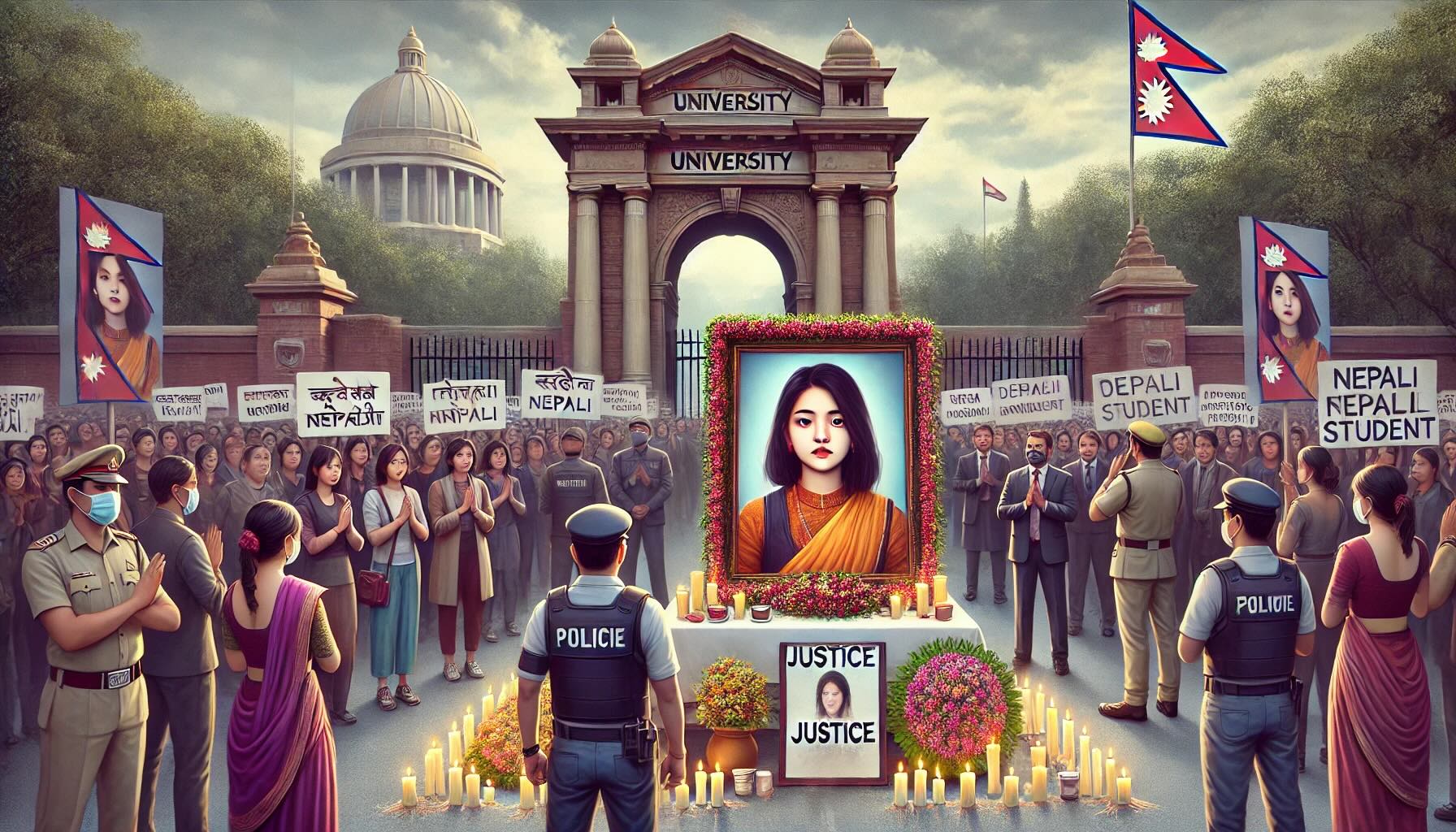Justice Over Politics: Investigating the Death of Nepali Student Prakriti Lamsal in India

The tragic death of Nepali student Prakriti Lamsal at KIIT University in Bhubaneswar, India, has sent shockwaves across Nepal and India, igniting public protests, diplomatic interventions, and intense media scrutiny. While the demand for truth and accountability remains paramount, the incident has also exposed the dangerous intersection of crime and politics, where justice risks being overshadowed by nationalist rhetoric and misinformation. This report delves into the chronology of events, institutional responses, crime rates affecting Nepali nationals abroad, and the broader implications for Nepal-India relations. In doing so, it also warns against the perils of over-politicizing criminal investigations, where emotional reactions can distort legal proceedings and inflame cross-border tensions.
The Incident and Immediate Response
Chronology of Events: What Happened to Prakriti Lamsal?
On February 16, 2025, the body of Prakriti Lamsal, a third-year B.Tech student from Nepal, was discovered in her hostel room at KIIT University. Initial reports from university officials and local authorities suggested suicide, but her family and fellow students raised concerns about harassment and emotional blackmail leading up to her death. Her father, Sunil Lamsal, stated that she had been under psychological distress due to the actions of another student, later identified as Advik Srivastava, who was subsequently arrested and charged.
Tensions escalated when more than 500 Nepali students staged protests within the university campus, demanding a thorough investigation. In a move widely criticized as insensitive and authoritarian, KIIT University administration issued a sudden eviction order for all Nepali students, instructing them to vacate hostels immediately. Many students were transported to railway stations without prior notice, adding to the chaos and worsening diplomatic concerns.
University & Local Authority Response
The Odisha State Government took cognizance of the matter and initiated action against security personnel involved in the mishandling of protesting students. The Bhubaneswar Police Commissionerate registered a criminal case against the accused, placing him in judicial custody. Additionally, the university terminated two security guards and suspended two senior hostel officials and an officer from the International Relations Office.
Despite these actions, KIIT came under fire for its delayed response, lack of transparency, and mishandling of international students. The Vice-Chancellor of KIIT issued a public apology, appealing to Nepali students to return to campus and resume their studies. The university also withdrew the sine die order and set up a 24/7 control room for the safety of Nepali students.
Nepali Government's Intervention & Diplomatic Engagement
The Nepali government swiftly responded to the crisis, with Prime Minister KP Sharma Oli acknowledging the incident, stating that diplomatic channels were actively engaged. The Nepali Embassy in India formally requested an independent probe and established a hotline for affected students. The Odisha government constituted a High-Level Fact-Finding Committee, led by the Additional Chief Secretary of the Home Department, to ensure an impartial investigation.
Nepali officials expressed concerns over the forced eviction of Nepali students, emphasizing the need for India’s Ministry of External Affairs to step in and ensure student safety. While Indian authorities assured full cooperation, growing public anger in Nepal hinted at the potential for this case to strain Nepal-India relations.
Crime Rate Comparisons & Nepali Victims Abroad
Nepalis Facing Crime Abroad: How Safe Are They?
This case is not an isolated event, as Nepali nationals abroad—students, workers, and migrants—often face crimes ranging from physical abuse to unexplained deaths. Nepali students in India, Gulf countries, the United States, and Australia have long encountered institutional negligence, security lapses, and legal loopholes that delay justice.
India’s Crime Index Analysis Compared to Other Countries
According to Numbeo’s Crime Index 2025, India has a crime index of 44.3, which is moderate compared to the U.S. (49.2) and Australia (47.3) but higher than the Gulf nations (UAE at 15.5, Qatar at 15.8). However, crimes against Nepali nationals in India often go unreported or unresolved, making statistical comparisons difficult.
Nepali Migrant Worker Deaths & Lack of Transparency
Pattern of Suspicious Deaths
Beyond student safety, the alarming rate of Nepali migrant worker deaths in Gulf nations remains an unresolved crisis. Thousands of Nepali workers die abroad every year, with a significant number of cases attributed to "natural causes" or "cardiac arrest", raising questions about the real causes behind these deaths.
Government Accountability: Are Foreign Labor Agreements Failing?
Nepal’s foreign labor policies have failed to secure adequate protections for its workforce. Many workers are sent back in coffins without proper investigations, leaving families in legal limbo and financial ruin. The case of Prakriti Lamsal highlights similar systemic neglect, where authorities respond only after public outrage erupts.
Public Protests & Diplomatic Tensions
Student Movements & Public Reactions
Outrage over Lamsal’s death has sparked protests in Kathmandu and across India, led by student unions, human rights activists, and the Nepali diaspora. Demonstrators demand a fair trial, compensation for the victim’s family, and stricter regulations for Nepali students studying abroad.
Cross-Border Tensions & The Risk of Political Exploitation
Although justice is the primary goal, over-politicization could turn the case into a diplomatic flashpoint. Politicians in both countries risk using the incident for political mileage, which could derail legal proceedings and inflame nationalist sentiments.
Institutional Negligence & Power Abuse in Universities
Pattern of Institutional Failures in South Asian Universities
Student safety has become a growing concern across South Asian universities, where cases of sexual harassment, ragging, and administrative cover-ups have frequently emerged. Institutions often prioritize reputation over justice, suppressing whistleblowers and victims rather than addressing root causes.
Reforming University Accountability
Universities must implement strict anti-harassment policies, mandatory counseling services, and grievance redressal mechanisms to ensure student safety. International students, in particular, should have direct diplomatic access to their embassies in times of crisis.
Media Influence & Misinformation
Leaked Videos & The Role of Social Media
The spread of leaked videos showing KIIT staff making derogatory remarks about Nepal has intensified public anger and fueled online outrage. While social media has played a role in exposing institutional failures, it has also amplified misinformation, complicating investigations.
Sensationalism vs. Responsible Journalism
Media outlets must prioritize facts over speculation, ensuring that reporting does not jeopardize legal proceedings. The rush to frame narratives without evidence can further politicize criminal cases, drawing parallels to past incidents like the Hrithik Roshan Nepal riots in 2000, where misinformation led to unnecessary violence.
Justice Over Politics
The tragic loss of Prakriti Lamsal demands justice, accountability, and institutional reforms—not political opportunism. Nepal and India must cooperate rather than clash, ensuring that such cases lead to tangible policy changes that protect students and migrant workers alike. While public pressure is crucial, justice should be pursued through transparent, legal avenues rather than media trials and nationalist rhetoric. If this case is mishandled, it risks becoming another politicized tragedy, diverting focus from the core issue: the protection and dignity of Nepali nationals abroad.
Prakriti Lamsal



![From Kathmandu to the World: How Excel Students Are Winning Big [Admission Open]](https://nepalaaja.com/img/70194/medium/excel-college-info-eng-nep-2342.jpg)
